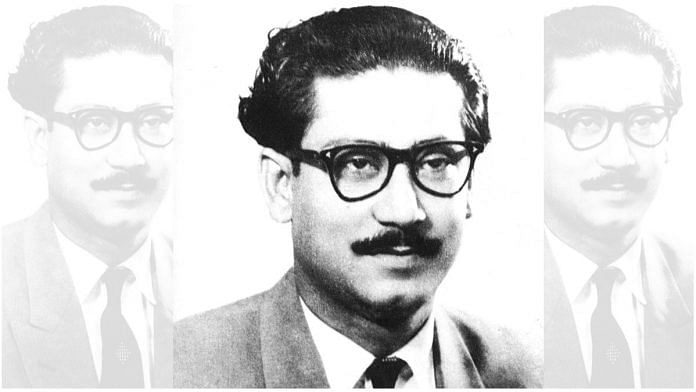New Delhi: Prime Minister Narendra Modi is visiting Dhaka to celebrate the 50th anniversary of Bangladesh’s independence and 101st birth anniversary of its founder Sheikh Mujibur Rahman. In episode 711 of ThePrint’s ‘Cut the Clutter’, Editor-in-Chief Shekhar Gupta explained how Rahman led the movement against the Pakistan army, and the significance of Modi’s current visit.
Bangladesh was liberated on 16 December 1971. A new provisional government came into being in January, the next year, after the Pakistan government released the jailed Sheikh Mujibur Rahman.
Gupta said Rahman had initially begun with a demand for autonomy through federalism for what was then East Pakistan, but this was denied and so, finally, it became a movement for a separate country — the Bangladesh Liberation movement. On 15 August 1975, he was assassinated.
Gupta had an interesting observation about the liberation of Bangladesh: when India helped Bangladesh gain freedom and Rahman became the first prime minister, there were two contemporaries working together — Indira Gandhi (who was then prime minister) and Rahman — they were almost of the same age.
Narendra Modi is conferring the Gandhi Peace Prize on him posthumously. “This is a very big gesture,” Gupta said.
“Modi’s visit and the award is an acknowledgement of the goodwill of the people of Bangladesh, gratitude to Sheikh Hasina and to reassure the people of the country that the BJP-RSS government is not hostile to Bangladesh,” he explained.
Sheikh Mujibur Rahman & history of Bangladesh liberation
Sheikh Mujibur Rahman is called ‘the father of Bangladesh’ and he died very young. “Rahman conjured the idea of Bangladesh. His party is now controlling the country. His daughter — Sheikh Hasina — now rules the country with a government elected with a large majority,” Gupta said.
When India was partitioned in 1947 and East Bengal became a part of Pakistan, a new political party was launched — the Awami Muslim League. A young Mujibur Rahman was quite active in politics and started to demand more rights for the people of the East Pakistan.
The then seniormost leader, Huseyn Shaheed Suhrawardy, who was the third leader of East Bengal, also became the prime minister of Pakistan for a brief period. He died in Lebanon in 1963 and Mujibur took over the Awami League party.
He dropped ‘Muslim’ from the party’s name and his politics, and the party took a very strong socialist left wing turn in the 60s, said Gupta.
In the 1970 general elections, the Awami League won a full majority in Pakistan’s parliament but West Pakistan refused to accept it. The people of East Bengal then found another denominator of nationalism — Bengali culture, language and identity.
“So in this case, linguistic, cultural and ethnic impulse triumphed over the Islamic religious impulse and a cultural, ethnic linguistic nation was created,” Gupta said.
Also read: Gandhi Peace Prize for Sheikh Mujibur Rahman, late Sultan of Oman
Change in Constitution
On 25 March 1971, the Pakistan army launched a crackdown in Dhaka on protests for a new state and many people were killed — a massive campaign of genocide by the army, followed.
After the 1971 liberation war, Pakistan released Sheikh Mujibur Rahman and he became the prime minister. Like Indira Gandhi, Mujibur also fell back on authoritarian measures — he banned a free press and became a constitutional dictator.
Another complication that arose was that a lot of those in the Bangladeshi army were earlier in the Pakistan army and retained a Pakistani “impulse”.
“The resentment over Mujibur and general unhappiness among the population led a bunch of army officers to assassinate him on 15 August, a very few months after the Emergency,” explained Gupta.
After his death, one military junta after the other came to power. General Ziaur Rahman then subverted the Bangladesh Constitution and issued many proclamations over the next three years which essentially changed its character into an Islamic Republic.
In 2005, the high court made a verdict stating the changes in the Constitution were wrong and had to be reversed.
A hunt for Mujibur’s assassins was conducted — five of them were caught, earlier, and executed in 2010, while the sixth, Captain Abdul Majed, was living in Kolkata. He was executed in April 2020 in Bangladesh.
Modi’s visit
Gupta then turned to the importance of Bangladesh to India.
Two major Indian states — West Bengal and Assam — share large borders with Bangladesh.
“Parts of Bihar (is) also affected by what happens in the bottom district of Bangladesh. Meghalaya, Tripura and Mizoram, have contiguity with Bangladesh. So all these are very important strategic issues for India…” he said.
India has made corrections in its ties with Bangladesh, in 2019 before the Lok Sabha elections, and also afterwards. When the anti-CAA agitation started in India, a lot was said that hurt the people of Bangladesh. The Modi government has been making efforts to correct that for the past couple of years and Modi’s visit to Dhaka now is a culmination of it. In 2015, PM Modi after being elected to power also made a visit to Bangladesh, said Gupta.
Watch the full episode here:
Also read: No Mujib, armed ‘mukti juddhas’ and tension —The year after Bangladesh’s liberation




And that is the reason Modi visits Bangladesh? It is a matter of perception that it suits RSS if a neighboring country like Bangaldesh is not a secular nation since the very law of amendment to the Citizenship Act ie CAA calls Bangaladesh as such and on the statute of India never there has been mention of These three countries including Bangaldesh as a nation from where religious persecution of Minorities will be accepted a its citizen. This very law has turned the friend on the border alienated and allowed it to have Chinese influence in the region.
If someone thinks Bangladesh is a secular state, he is mistaken. Bangladesh is an islamic state through a constitutional amendment in 1988. Hindu temples are regularly burned down by the majority religion.